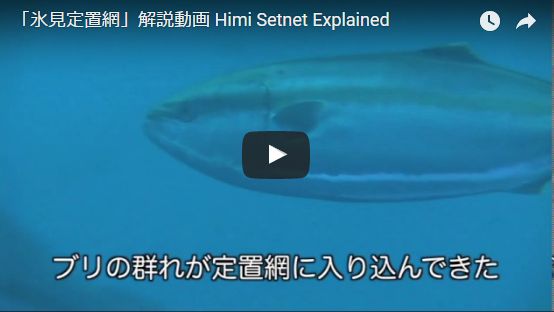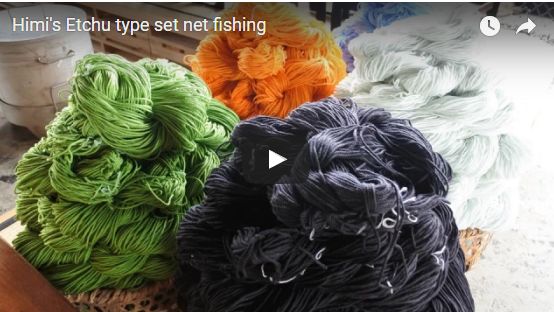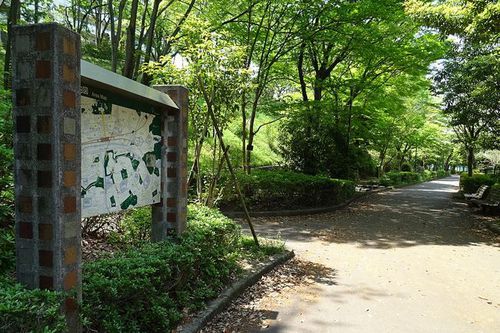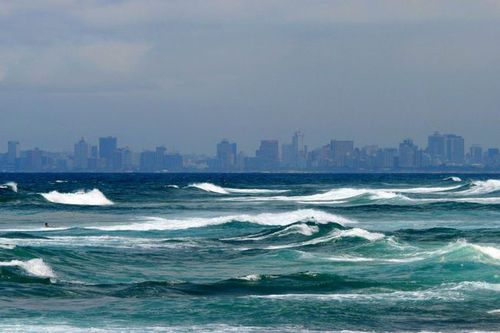"Goal 14: Life Below Water" SDG video competition
Himi City and JFS selected among the top 10!
:*::*::*::*::*::*::*::*::*::*::*::*::*::*::*::*::*::*::*::*::*::*::*::*::*::*::*::*::*::*::*::*:

Himi Setnet Explained

Himi's Etchu type set net fishing
The Embassy of Sweden in Tokyo called for submission of Agenda 2030 Sustainable Development Goals - ["Goal 14 Life Below Water" video competition] from January 30 to April 3, 2017.
Responding to this call, Himi City and JFS jointly submitted a video about sustainable fishery practice in Himi City, Toyama Prefecture, based on the JFS newsletter article.
Sustainable Fishery Catches Only 30% of Fish Entering Net -- Etchu-type Set Net Fishing in Himi
JFS video was selected one of the top 10 videos and was invited to Sustainable Fika (Swedish-style coffee break with cakes, etc.) at the Embassy of Sweden on April 20, 2017. It was honored by the attendance of Her Royal Highness Crown Princess Victoria, who was visiting Tokyo.
Please see the JFS and other winners' [awarded videos.]

Image by Konaine Some Rights Reserved.
Tokyo Metropolitan Government (TMG) issued its first green bonds on November 24, 2016. The bonds, named "Tokyo Environment Supporter Bonds," were issued in Australian dollars at an amount equivalent to 10 billion yen. Tokyo Governor Yuriko Koike announced at a regular news conference the next day that the bonds were sold out on the same day they were issued.
Green bonds are issued by enterprises and local governments to procure funds needed for renewal energy development and other projects that contribute to the resolution of environmental issues such as global warming. The Tokyo Environment Supporter Bonds were issued under the following conditions: term, 5 years; interest rate, 2.74%, purchase limit, 1,000 to 1 million Australian dollars per person or organization. Targeted purchasers were residents, workers, and students in Tokyo, Saitama, Chiba, and Kanagawa areas, and corporations and organizations that have their main office in the same areas.
Koike stated that the funds will be allocated to, for example, the introduction of renewable energy such as photovoltaic generation systems, and the renovation of TMG-owned facilities to replace lighting systems with energy-saving LEDs,. The funds will also be applied to projects selected in consideration of their urban greening and climate adaptation benefits. TMG will move forward with full-scale issuance of green bonds in the next year in light of this year's trial issue.
NEDO to Launch Demonstration Project for Energy-Saving Seawater Desalination Technology in South Africa

Image by Lynn Greyling.
The New Energy and Industrial Technology Development Organization (NEDO) in Japan announced on November 17, 2016, the launch of a demonstration project for an "integrated system of seawater desalination and water reuse," in collaboration with the City of Durban in the Republic of South Africa. Based on an energy-saving system developed by NEDO, they aim to address serious issues of water shortages caused by massive droughts in South Africa.
The new system uses excess water from the process of sewage treatment to dilute seawater (coming into the system to be desalinated) and decrease its salt concentrations, making it possible to cut electricity consumption by more than 30 percent compared to existing seawater desalination systems. Seawater desalination can often negatively affect the surrounding marine environment due to the discharge of highly concentrated saltwater. However, by desalinating diluted seawater the system can bring discharged water to about the same salt concentrations as seawater, thereby minimizing the effects on the marine environment.
NEDO and the city plan to build one of these units at a sewage treatment plant in central Durban within three years, capable of producing 6,250 tons of drinking water per day from seawater and recycled water, and demonstrate a reduction of at least 30 percent in energy consumption, with a reduced impact on the surrounding marine environment compared to conventional systems. They plan to develop this as future water supply project for Durban, and aim to spread the technology across South Africa, with its severe problems of water scarcity, and all over Africa.
What's New This Week from JFS (2 - 8 May. 2017)
This month's cartoon:Modern alchemy (2017/5/8)
http://www.japanfs.org/en/manga/manga_id035825.html
Japan for Sustainability (JFS) is a non-profit communication platform to
disseminate environmental information from Japan to the world. We are
grateful that people in 191 countries have found an interest in our free
e-mail publications, and will continue to do our best to deliver useful
information to our readers all around the globe.
Please feel free to forward this message to your colleagues and friends
wherever the Internet can reach. If you know colleagues or friends there
with an interest in sustainability, please do forward them one of our
newsletters and invite them to try our service. To subscribe for JFS
Newsletters, visit www.japanfs.org/en/newsletter/subscribe.html

If you find our information and activities unique and valuable,
we appreciate your support!
http://www.japanfs.org/en/join/donation.html

Use this form http://www.japanfs.org/acmailer/unsubscribe.html to
remove your email address from our mailing list.

We welcome your comments. Please send them to: info@japanfs.org

Japan for Sustainability (JFS)
 |  |  |
Copyright (c) 2017, Japan for Sustainability. All Rights Reserved.

